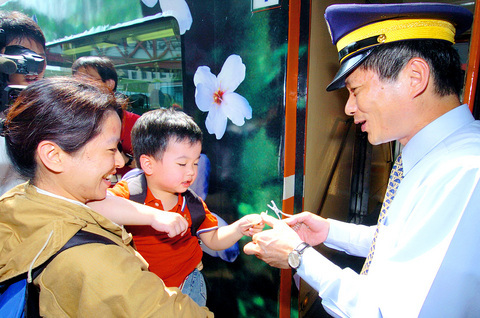Hakka flower festival kicks off (original) (raw)
The fourth annual Tung Blossom Hakka Festival kicked off yesterday with a concert, drum show and a dancing performance in celebration of Hakka culture, held at a mountain resort of Miaoli County.
The ceremony, held at the Westlake Resortopia in Miaoli County, marked the beginning of a month-long festival sponsored by the Council of Hakka Affairs to promote Hakka culture. The festival's symbol is the tung blossom, a flower that blooms from mid-April to late May in central and northern Taiwan.
Acting chairman of the Council of Hakka Affairs Lee Yung-de (李永得) promised this year's festival to be bigger and better than ever.

Dressed as a ticketman, acting chairman of the Council of Hakka Affairs Lee Yung-de, right, yesterday punches the ticket of a passenger bound for Maoli County at Taipei's Songshan train station to attend the 2005 Tung Blossom of the Hakka Festival.
PHOTO: SEAN CHAO, TAIPEI TIMES
"Within four years, the Tung Blossom Festival has become one of the most successful cultural events in Taiwan. With new activities, festival train services and special tour guides for English and Japanese-speaking travelers, we hope to transform the Hakka festival into an international cultural event," Lee said yesterday.
Senior presidential adviser and former Hakka council chairwoman Yeh Chu-lan (葉菊蘭) attended the ceremony to invite the public to experience the rich Hakka culture through the festival.
"The Tung flower represents the purity of the Hakka people. I am here to invite all the people in Taiwan to visit the Hakka communities, listen to the beautiful Hakka dialect, and enjoy the amazing scenery of the white Tung flowers," said Yeh.
To express the Hakka community's gratitude to the mountains, Lee and Yeh joined with representatives of major Hakka communities to stage a special ritual to honor mountain deities. Items offered at the altar to deities included traditional Hakka rice cakes, ginger, brown sugar, tea leaves, green onions, mochi and sweet potatoes, representing foods that come from the mountains.
Pop-rock band MayDay performed popular songs from their albums and invited the young crowd to sing along. Hakka performing arts groups, including Nanzhung Dragon Dance Group, Wayao Valley 3 band with lead singer Lin Sheng-hsiang (林生祥) -- a vanguard of the movement for the revival of Hakka culture through its music -- also spread their love of Hakka culture during the ceremony.
Fu Shin Elementary School of Hsinchu County performed the theme song for this year's festival, Tung Flowers, written by the Hakka folk song singer-songwriter Chen Yung-tao (陳永淘).
Over 106 Hakka communities from Taipei, Taoyuan, Hsinchu, Miaoli, Taichung and Nantou counties joined this year's festival with more than 600 cultural events that were designed to boost tourism in Hakka communities.
The council will provide a "Tung Blossom Festival Train" every weekend between Taipei and Changhua County in hopes of easing the burden of traffic.
"Taiwan's railway administration has partnered with the council this year. With better transportation services, we believe the festival will attract more local visitors, as well as international friends," Taiwan Railway Administration Director-General Hsu Ta-wen (徐達文) said.
Ceramic workshops in Maioli County welcomes visitors with tung flower products and pottery activities. During the month-long festival, the public is invited to visit the 21 "tung blossom sightseeing paths" that have been created in the six counties hosting the festival. The tung trees often grow close to Hakka communities, and used to be an important source of income.
Last year's festival attracted 2.7 million visitors and generated NT$500 million in revenue. This time around, the council invited travel agencies from Germany, Australia, New Zealand, the US and Japan to visit the festival, expecting them to boost the local tourism.
For more details on festival activities and sightseeing paths, visit the council's website at www.hakka.gov.tw. For train service inquiry, call 02-2381-5226, ext. 2538.


